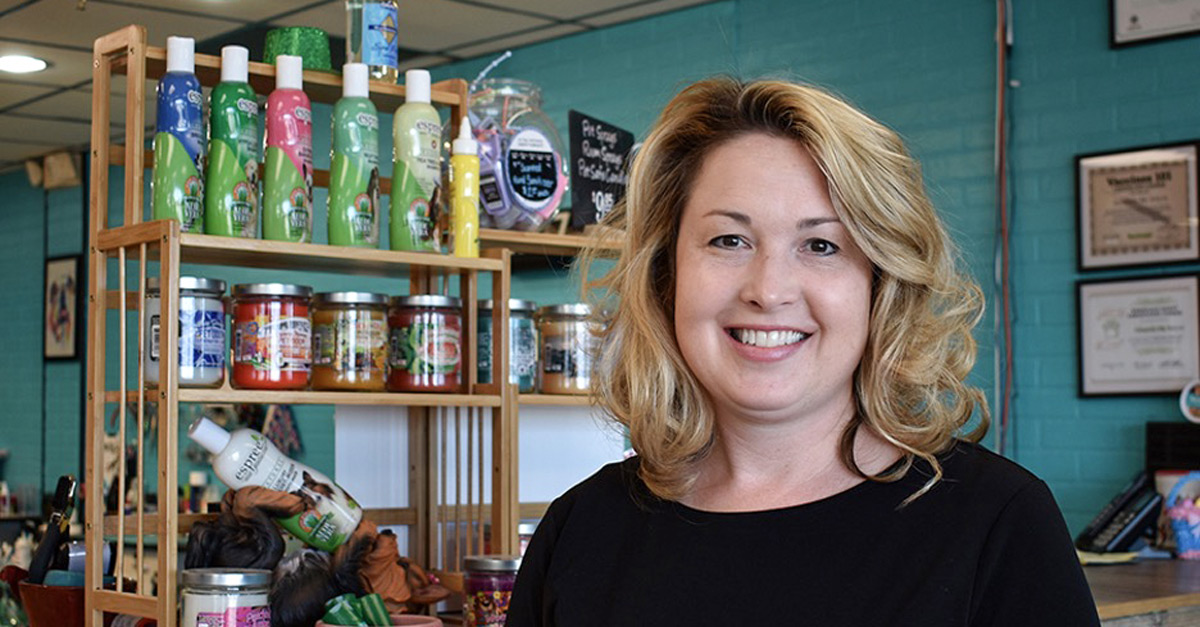I started Empowering the Parent to Empower the Child (EPEC) in 2016 with a mission to help Kansas City children stuck in the cycle of generational poverty. Inspired by my mom’s own successful career as a groomer, I opened EPEC’s first program, The Grooming Project (which would go on to become Pawsperity), to teach struggling parents the trade that had helped keep my own family afloat in small-town Iowa.
By 2016, my years spent in the nonprofit world had convinced me that to have any chance of lifting children from this cycle, I would need to develop a program that went “all in” at helping their parents first. If we want a child to value education, stay off drugs, and find a meaningful career, those things must first be modeled in the home. If a mom is working nights and weekends in a minimum-wage job, she is likely leaving children home alone, often with a young child watching an even younger child. But regardless of how hard she works and regardless of the sacrifices she makes to do that work, the money earned is often a net-loss for the children—their mom is giving up critical parenting time for income that won’t benefit the family in any significant way. Money and time—these are two of the key insufficiencies that can set a child off on the wrong path.
Pawsperity believes that the most impactful way we can better the lives of struggling families is to train parents in a living-wage, family-friendly trade. We go a step further, though, offering comprehensive support services to the entire family—legal advocacy, case management, dental care, soft skills courses, and transportation assistance, just to name a few.
This all-in model for ending generational poverty could work with other professions, but we’ve chosen pet grooming because it provides living wage pay after only six months of training. Our program is intense, but also quick, allowing a family’s life to change drastically in under one year.
At Pawsperity, we also know there is a transformative power in giving people what we call an equitable first chance—making basic, life-simplifying things available that most of us take for granted each and every day, like a support system and a safe place to sleep. Students like ours, who have been left out of meaningful career paths, can find a sense of belonging and relief from systemic barriers in our program. The grooming trade is a forgiving one due to the demand, allowing entry to those with a criminal record or without a high school diploma.
Additionally, our organization understands that a life of poverty is often synonymous with a life of trauma and toxic stress. Chronic exposure to scarcity and instability makes it difficult for cognitive processes such as critical thinking, decision making, and emotional regulation to operate smoothly, if at all. In childhood, this can manifest as behavior problems; in adulthood, this often looks like chronic unemployment, unhealthy relationships, or substance abuse.
Fortunately, the art of grooming promotes healing. The human-animal connection is an intangible force powerful enough to make human stress hormones drop within minutes. Our students quickly discover that if they approach a dog with anything other than calmness and patience, that dog will be difficult to groom. Every interaction with a dog in our program is an immediate lesson in self-regulation. Over time, these lessons and the reduction in stress hormones can translate into reduced anxiety and a calmer presence at home. Animals, we have found, can provide adults who have a history of anxiety or unstable employment a powerful incentive to show up to work each day. They can also help them become better parents.
The small idea inspired by my mother grooming in our rural Iowa garage has grown into a powerful program that is rewriting the script for what a single mom living in poverty can do with her life. The transformations I’ve witnessed are nothing short of amazing. My hope is that you’ll learn more about us, be inspired, and feel compelled to get involved by bringing your dog in for a groom, volunteering your time and talent, or donating to our cause. The barriers our students face are complex, but our program’s intentions are simple:

